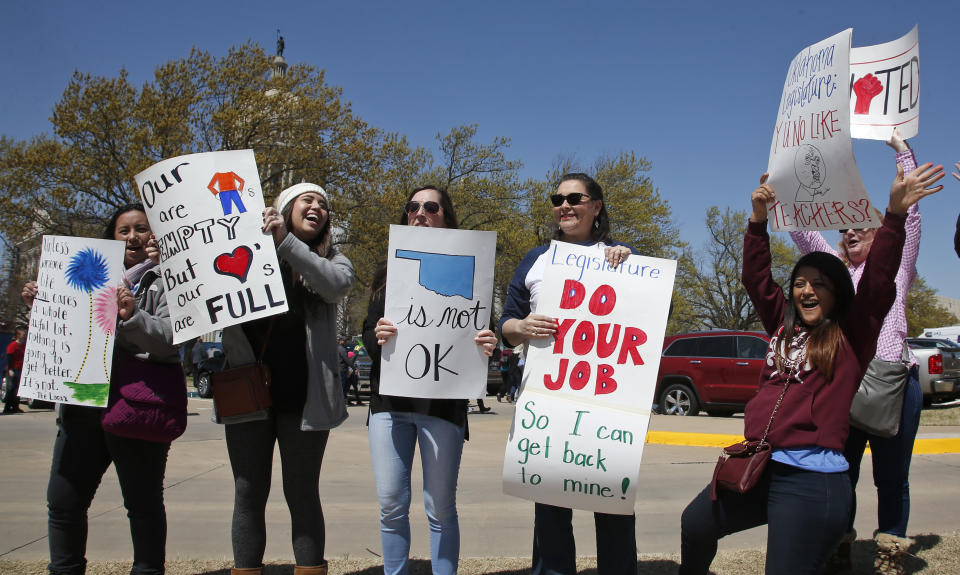Could high school coaches in Oklahoma have made bigger difference for striking teachers?
Barney Moon picked up the phone and almost immediately apologized for being emotional.
“You’re talking to me at a real bummer of a time,” he said.
He had just found out some unexpected and unwanted news: the nine-day Oklahoma teachers’ strike was called off without the money they hoped for. Moon and his fellow educators won a $6,100 raise per teacher, but fell short of their larger goals. They will go back to school Monday.
“It’s really been frustrating,” said the teacher at Yukon High School, located west of Oklahoma City. “Been here [at the state capitol] every day. Protested every day.”

Moon, 58, was as involved as any teacher. But in one sense he stood alone. He is also a boys tennis coach. He made the decision not only to walk away from the students he loved, but the players he loved. Most of the state’s coaches went on, as did the state’s prep sports.
Moon said it was the hardest professional choice he ever made, in more than two decades of teaching. He also said he wishes some other coaches had made the same choice.
“Had more of the coaches walked out and decided not to participate in extra-curricular activities, I believe the legislature would have felt a bigger pinch,” Moon said. “As far as I know, no coaches contacted me [about walking out in solidarity]. Not one.”
He got lots of vocal support, but that was where the backing seemed to end. Giving up school was one thing; giving up sports was, apparently, going too far.
“When Russell Westbrook makes $100,000 a game and I make what I make, yeah I’ve got a problem,” lamented Moon, who said his salary is $50,000 per year, including side jobs as a private coach. “You bet, sir. You bet. Our athletics are our heroes and it’s the wrong hero. It is the wrong hero.”
In one sense, Moon understands why coaches didn’t come out in force. Many are worried that bailing out on kids might hurt their scholarship chances. What if a recruiter passes through the area and an opportunity is missed? It feels like twice the punishment: no school and no games.
But at the same time, he also feels sacrificing academics but not athletics was the wrong message. He has 30 kids in each of his history classes. He has old textbooks. (And Yukon High is in what he calls an “affluent” area.) But resources always seem to overflow when it comes to high school football. Why are sports more sacred? And why didn’t teachers use that set of priorities as leverage?
Missing a few days of school because of a teachers’ strike probably wouldn’t cause that much chaos anywhere. But missing a high school football game because of a coaches’ strike? Bedlam.
“Not only more coach participation, but more celebrity participation would have made a difference,” said Tiffany Graves, an Oklahoma-based attorney who supported the teachers through the strike (though she didn’t represent any of them). “This is Oklahoma. We like football and country music.”
Oklahoma State football coach Mike Gundy lent his support to the cause, telling the Oklahoman newspaper that teachers in his state are “way overworked and way underpaid.” That certainly made waves, but it didn’t make for a lot of extra pressure. (Considering Gundy got a raise this year from $4.2 million to $5 million, it can be argued that’s part of the problem.)

Moon was fearful when he made his decision. He worried about his job, his family and his players. Half of his team members are seniors. This could have been farewell to those boys.
“I am faced with a very difficult decision,” he told them. “I’m angry that I’m put in this position. My stand is I cannot and will not say that athletics are more important than education. I will not say that. I think I’m sending you that message.”
When he finished, the players began to clap for him. Some gave him hugs. Moon choked up. It meant everything.
The team decided to play the next match without their coach.
“I’m embarrassed to tell you, they did very good,” he said, laughing.
Moon was born in Alaska and his family moved to Oklahoma when his dad got a job with the FAA. He vividly remembers when he was in the sixth grade and he marched against the Vietnam War with his parents. He had long hair and a necklace with a peace sign. These days, Moon often thinks of those days.
“A man has to stand up for what he believes in,” he said. “There comes a time in a man’s life when you’re going to have to say, ‘This is where I stand. This is where I will hold my fort.’ It gave me an inspiration.”
This was his time. It still is his time.
He just wishes it was other coaches’ time, too.
“I believe in my heart,” he said, “we could have made more of a difference.”
More from Yahoo Sports:
• Kevin Iole: VanZant’s brave rape admission met with hate
• Report: Seattle postpones Kaepernick workout over kneeling
• Red Sox icon says pitcher handled brawl ‘perfectly’
• Jerry Jones takes center stage in Kaepernick legal battle

